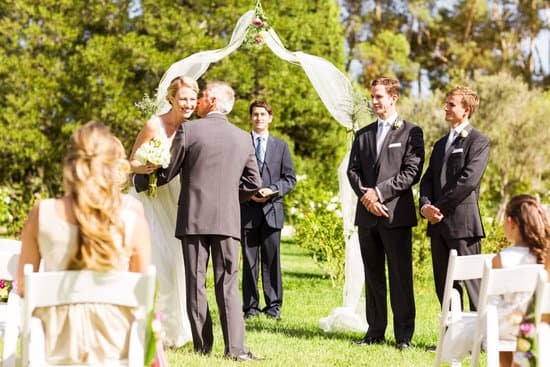How much does the groom pay for a wedding? This is a common question that many grooms-to-be have as they navigate the complex world of wedding planning. Understanding the financial aspect of weddings is crucial for any groom, as it not only involves budgeting and spending but also reflects traditional responsibilities and mutual support within a relationship.
In this article, we will delve into the various financial challenges faced by grooms when planning a wedding, the average cost breakdown of a wedding, and tips for setting a budget and managing expenses. We will also explore alternative options for saving on costs and the importance of open discussions with your partner about wedding expenses.
Traditionally, there are certain responsibilities that fall on the groom when it comes to wedding expenses. However, in modern times, these roles have evolved, and both partners often share in the financial burden of planning a wedding. As grooms navigate through this process, they may encounter financial challenges such as setting realistic budgets, dealing with unexpected costs, and managing different expectations from family members.
The average cost breakdown of a wedding can vary greatly depending on factors such as location, guest count, and personal preferences. Understanding how to contribute as a groom while also setting realistic expectations is key in managing these expenses. In the following sections, we will provide tips and strategies for grooms on budgeting and navigating through the financial aspects of weddings while maintaining open communication with their partners.
Traditional Responsibilities of the Groom in Wedding Expenses
The groom has traditionally been responsible for covering certain expenses related to the wedding. These responsibilities often include the engagement ring, the marriage license, the officiant’s fee, and the bride’s bouquet. Beyond these specific items, there may also be cultural or familial expectations for the groom to contribute financially to other aspects of the wedding, such as the rehearsal dinner or the honeymoon.
Depending on the specific customs and traditions of a couple’s background, there may be varying expectations for what the groom is expected to pay for. It is essential for grooms-to-be to have open and honest conversations with their partner about these expectations and come to a mutual understanding of who will be responsible for which expenses. This clarity can help avoid misunderstandings and financial strain during what should be an exciting time in a couple’s life.
In addition to these traditional responsibilities, modern couples often approach wedding budgeting as a shared effort between partners. It is increasingly common for both partners to contribute financially based on their individual circumstances. The exact breakdown of wedding expenses can vary widely from one couple to another, based on factors such as income levels, family resources, and personal preferences.
| Expenses | Groom’s Responsibility |
|---|---|
| Engagement Ring | Traditional |
| Marriage License | Traditional |
| Officiant’s Fee | Traditional |
| Bride’s Bouquet | Traditional |
Financial Challenges Faced by Grooms When Planning a Wedding
When it comes to planning a wedding, grooms often face various financial challenges that can make the process daunting. One of the biggest challenges is the pressure to contribute financially to the wedding expenses while also managing other financial obligations. Many grooms may feel overwhelmed by the expectation to cover a significant portion of the wedding costs, especially in traditional settings where certain expenses are seen as their responsibility.
In addition, grooms may also struggle with setting a realistic budget and sticking to it. With the average cost of weddings continuously on the rise, it can be difficult for grooms to navigate through all the necessary expenses without overspending. This pressure can lead to stress and anxiety, impacting not only their financial well-being but also their overall wedding experience.
Furthermore, societal expectations and norms around weddings can create additional financial challenges for grooms. From engagement rings to rehearsal dinner costs, there are numerous traditional expenses associated with being a groom that may add up quickly. In some cases, these expectations can put a strain on a groom’s finances and force them to make difficult decisions about what they can afford.
Overall, understanding how much does the groom pay for a wedding is essential in addressing the financial challenges they face when planning such an important life event. By acknowledging these challenges and finding ways to overcome them, grooms can better navigate through the complexities of wedding expenses while ensuring that their financial well-being is taken into consideration.
The Average Cost Breakdown of a Wedding and the Groom’s Contribution
The average cost of a wedding can vary widely depending on factors such as location, number of guests, and the overall extravagance of the event. However, it’s crucial for grooms to have a clear understanding of the typical breakdown of wedding expenses and how much they are expected to contribute. Traditionally, grooms have shouldered certain financial responsibilities when it comes to weddings, and being aware of these expectations can help in planning and budgeting for the big day.
According to industry experts, the groom is typically expected to cover specific costs related to the wedding. These may include the engagement ring, marriage license fees, officiant fees, and sometimes even the cost of the honeymoon. In addition, many grooms also take on the responsibility of paying for their tuxedo or suit rental, as well as gifts for their groomsmen.
In terms of overall wedding expenses, data from The Knot’s 2019 Real Weddings Study indicates that the average cost of a wedding in the United States was approximately $28,000. It’s important to note that this figure can fluctuate significantly based on geographical location and other factors. When it comes to contributing financially, grooms often play a significant role in covering some of these expenses.
For example, they may contribute to costs associated with the rehearsal dinner or take on a portion of the venue rental fees. Having an understanding of these average costs can help grooms set realistic budgets and navigate their financial responsibilities effectively.
| Category | Percentage of Total Budget |
|---|---|
| Reception Venue | 25% |
| Photography/Videography | 15% |
| Catering | 20% |
Tips for Grooms on Setting a Budget and Managing Wedding Expenses
When it comes to setting a budget and managing wedding expenses, grooms play a crucial role in ensuring that the financial aspect of the big day is carefully planned and executed. Here are some tips for grooms to effectively handle wedding expenses:
- Communicate openly: Have an honest conversation with your partner about your financial situation and set a realistic budget together. Discuss what aspects of the wedding are most important to both of you and prioritize your spending accordingly.
- Do your research: Take the time to research and compare prices for venues, vendors, and other wedding essentials. Look for cost-effective options without compromising on quality.
- Track your spending: Keep a detailed record of all wedding-related expenses to stay within budget. Consider using budgeting tools or apps to help you monitor your spending and make adjustments as needed.
It’s important for grooms to be proactive in managing wedding expenses, especially in today’s economic climate where couples often shoulder the financial burden together. By taking on an active role in budgeting and expense management, grooms can contribute to creating a memorable and meaningful wedding day without breaking the bank.
Grooms should also consider seeking support from family members or close friends who may be willing to help out financially or offer resources such as connections to affordable vendors. Ultimately, by being mindful of their budget and making informed decisions, grooms can navigate the planning process with confidence while ensuring that their wedding day reflects their unique love story.
Alternatives and Compromises for Grooms to Save on Wedding Costs
When it comes to wedding costs, grooms may find themselves facing significant financial pressure as they navigate the process of planning their big day. Fortunately, there are several alternatives and compromises that grooms can consider in order to save on wedding expenses without sacrificing the overall quality and experience of the event.
DIY Decor and Details
One way for grooms to cut down on wedding costs is by taking a hands-on approach to certain aspects of the wedding. By embracing do-it-yourself (DIY) projects for decor and details, grooms can not only save money but also add a personal touch to their special day. Whether it’s creating handmade centerpieces or designing custom invitations, DIY projects can significantly reduce expenses while adding a unique and heartfelt element to the celebration.
Off-Peak Wedding Dates
Another practical consideration for grooms looking to save on wedding costs is selecting an off-peak wedding date. Choosing a time of the year when venues and vendors are less in demand can result in considerable savings. Many venues offer discounted rates for weddings held during weekdays or off-season months, allowing grooms to still have their dream wedding at a more affordable price.
Flexible Venue Options
Flexibility with venue options can also provide cost-saving opportunities for grooms. Instead of opting for traditional high-cost venues, grooms can explore alternative locations such as parks, community centers, or even family-owned properties. These non-traditional venues often come with lower rental fees and more flexibility in terms of catering and decor options, making them an attractive choice for couples looking to save on wedding expenses.
By considering these alternatives and compromises, grooms can navigate the financial aspects of weddings more effectively without compromising on the joy and significance of their special day.
How to Have Open and Honest Discussions About Wedding Expenses With Your Partner
When planning a wedding, it is crucial for both partners to have open and honest discussions about wedding expenses. This not only ensures transparency and understanding between the couple but also helps in managing financial expectations and responsibilities. Here are some tips on how to navigate this important aspect of wedding planning:
- Set aside dedicated time to talk: Schedule a time when both partners can sit down and discuss wedding expenses without distractions. This can help create a conducive environment for an open and constructive conversation.
- Be transparent about finances: Share your individual financial situations, including income, savings, debts, and any other relevant information. This will give both partners a clear understanding of each other’s financial standing.
- Establish priorities: Discuss what aspects of the wedding are most important to each of you. Whether it’s the venue, catering, or entertainment, establishing priorities can help in allocating the budget accordingly.
Having open and honest discussions about wedding expenses can also lead to compromises and creative solutions that can help in managing costs effectively. It is important for grooms to approach these conversations with patience, empathy, and a willingness to find common ground with their partner.
Ultimately, being transparent about wedding expenses sets the tone for a collaborative approach to financial decision-making throughout the wedding planning process. By working together as a team, couples can navigate the often daunting task of managing wedding expenses while ensuring that both partners feel heard and understood.
The Importance of Teamwork and Mutual Support in Shouldering the Financial Burden of a Wedding
Planning a wedding can be financially daunting for both the bride and the groom. With the average cost of a wedding continuing to rise, it is essential for couples to work together as a team in shouldering the financial burden. By understanding the significance of mutual support and cooperation, grooms can navigate the monetary responsibilities of a wedding with their partner.
Understanding Each Other’s Financial Situations
One of the most crucial aspects of teamwork in managing wedding expenses is having open and honest discussions about each other’s financial situations. It is important for grooms to have transparent conversations with their partners about their individual financial capabilities and limitations. By doing so, couples can set realistic expectations and goals for their wedding budget.
Collaborative Budget Setting
When it comes to shouldering the financial burden of a wedding, it is vital for grooms and their partners to collaborate on setting a budget that aligns with their financial means. Grooms should work together with their partners to prioritize expenses and determine where they are willing to compromise or make sacrifices. By jointly setting a budget, couples can ensure that both parties feel involved in decision-making and are comfortable with the financial plan for their big day.
Supporting Each Other Through Financial Challenges
Throughout the wedding planning process, unforeseen financial challenges may arise. It is essential for grooms and their partners to support each other during these times. By approaching these challenges as a team, couples can find solutions together and alleviate some of the stress associated with managing wedding expenses. This collaborative approach will not only strengthen the relationship but also lead to more positive outcomes in handling the financial aspects of the wedding.
Conclusion
In conclusion, it is evident that the financial aspect of weddings can be a daunting and challenging responsibility for grooms. Traditionally, the groom is expected to take on certain wedding expenses, but in today’s modern society, there are various financial challenges that grooms face when planning a wedding. From the average cost breakdown of a wedding to setting a budget and managing expenses, navigating these financial aspects can be overwhelming.
However, there are ways for grooms to empower themselves and navigate the financial aspects of weddings successfully. By having open and honest discussions with their partner about wedding expenses, setting a budget, and exploring alternatives and compromises to save on costs, grooms can effectively manage their financial responsibilities. It is important for grooms to remember that teamwork and mutual support with their partner is crucial in shouldering the financial burden of a wedding.
Ultimately, while there may not be a simple answer to the question “how much does the groom pay for a wedding?”, grooms can take proactive steps to alleviate the stress associated with wedding finances. With careful planning, effective communication, and support from their partner, grooms can successfully navigate the financial aspects of weddings and contribute meaningfully to creating a memorable celebration of love.
Frequently Asked Questions
Who Pays for the Bride’s Dress?
Traditionally, the bride’s family is responsible for paying for the bride’s dress. However, modern weddings may involve different arrangements, with the couple or groom’s family contributing to the cost. Ultimately, who pays for the dress can vary depending on individual circumstances and preferences.
What Do Groomsmen Pay For?
Groomsmen are typically expected to cover their own attire, travel expenses if applicable, and any costs associated with hosting a bachelor party. This may include splitting the cost of a gift for the couple as well.
While there is no strict rule about what groomsmen should pay for, it is common courtesy for them to be prepared to cover these expenses.
Does the Husband Pay for the Whole Wedding?
The idea that the husband pays for the whole wedding is a traditional concept that has evolved over time. In modern times, both partners often contribute financially to their wedding.
In some cases, families of the couple also play a role in covering certain costs. Ultimately, who pays for the wedding can depend on various factors including cultural traditions and personal financial situations.

I have been involved in marriages for over 20 years helping couples and singles understand more about them.





